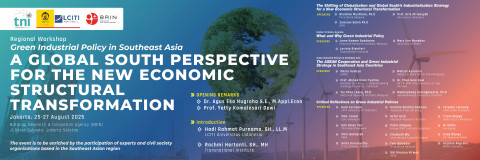A Global South Perspective for the New Economic Structural Transformation A Regional Workshop: Green Industrial Policy in Southeast Asia
Temas
Southeast Asia stands at the crossroads of the global green transition, rich in resources, strategic in trade, and pivotal in climate action. This workshop explores democratic, just industrial policies that challenge extractivism and empower Global South voices in shaping sustainable futures.

The Transnational Institute (TNI), the National Research and Innovation Agency of Indonesia (BRIN), and the Legal Centre for International Trade and Investment (LCITI) at the University of Indonesia are pleased to announce:
A Regional Workshop
Green Industrial Policy in Southeast Asia:
“A Global South Perspective for the New Economic Structural Transformation”
Date: 25-27 August 2025, Jakarta, Indonesia
Location: Widya Graha Building, National Research and Innovation Agency (Badan Riset dan Inovasi Nasional/BRIN)
Different regions pose distinct challenges for shaping states’ green industrial policies. East Asian countries—particularly those in Southeast Asia—play a pivotal role in the global transition to a green economy. The region is marked by a significant demographic size, abundant natural resources vital for a low-carbon future, strategic maritime trade routes, and some of the world’s largest forested areas.
We are witnessing renewed theoretical and political debates on development strategies within the energy transition framework, alongside critical perspectives that view (re)industrialization and state planning as essential public policy tools. Many Global South countries also possess key resources for the energy transition, strengthening their international bargaining power. This moment presents an opportunity for Global South nations to challenge extractivist practices and neo-colonial dynamics, break cycles of dependency, contest their subordinate position in the global economy, and move up the value chain through industrial policies that are just, democratic, and green.
At the same time, the region is also experiencing a shift toward autocratic leadership and state-led economic strategies prone to elite co-optation. This trend signals that a paradigmatic shift is underway. The exchange of ideas to better understand Southeast Asian green industrial policies is therefore of paramount importance.
This workshop is designed to address these challenges by leveraging expertise and fostering mutual support among researchers and civil society actors across Southeast Asia. Together, we aim to reconceptualize industrial policy and develop a compelling narrative for structural transformation rooted in social and democratic aspirations from a Global South perspective. Green industrial policy and politics can thus serve as a crucial agenda, connecting ongoing advocacy and campaigns on economic equality, international trade, climate justice, and financing for development.